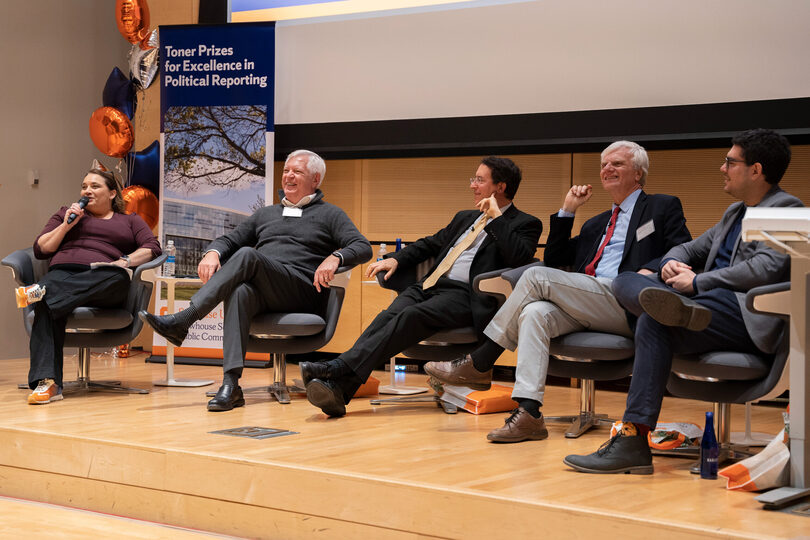Annual Toner Prize lecture celebrates bold political reporters

The prize is awarded to national and local reporting to honor alumna Robin Toner, the first female national correspondent for New York Times. Wenjing Zhu | Staff Photographer
Get the latest Syracuse news delivered right to your inbox.
Subscribe to our newsletter here.
When Politico obtained an initial draft majority opinion showing that the United States Supreme Court had voted to strike down the landmark Roe v. Wade decision, the outlet’s reporters were left with a major choice. As Politico was unable to reveal sources, reporters had to decide if it was worth it to put their reputation on the line to publish the document.
On May 2, 2022, Politico published it.
Politico’s story on the draft release became the first draft majority in the history of the court to be disclosed publicly while a case was still pending. It was awarded the 2023 Toner Prize for Excellence in Political Reporting.
The Toner Prizes – which are awarded annually by Syracuse University’s S.I. Newhouse School of Public Communications – recognize the best U.S. national or political reporting in any medium. The prize is awarded to both national and local reporting in honor of SU alumna Robin Toner, who was the first female national correspondent for The New York Times.
Josh Gerstein, Alex Ward and Peter Canellos of Politico and Phil Williams of Nashville’s WTVF-TV spoke about the processes behind their award-winning reporting Wednesday at SU’s “A discussion with the 2023 Toner Prize Winners” event in the Joyce Hergenhan Auditorium.
Politico won the national reporting award for its project “The Supreme Court and Abortion,” which began with its May 2022 publication breaking the Supreme Court’s draft opinion to overturn the 50-year-old super precedent set in Roe v. Wade. Williams won the local reporting award for his entry, “NewsChannel 5 Investigates: Revealed,” which examined the law-making process in Tennessee’s General Assembly.
When discussing Politico’s reporting, Gerstein said the Supreme Court has gone underreported by the press. He said the media does not cover the Supreme Court in the same “rigorous” way they cover other political institutions in Washington, including Congress and the White House.
“It’s not sufficient to go to the White House briefing and write down just what they say. That’s part of the story, but it’s only one part,” Gerstein said. “I do think that for many years that is, by and large, how the Supreme Court was covered.”
Collanos said Politico’s decision to publish the draft decision “opened the floodgates” for how the Supreme Court gets covered in the media. Releasing the document was “far better” for the country than choosing to keep it private, he said.
Williams similarly challenged how the government is covered by news media while looking at Tennessee’s state legislature, he said. After being frustrated with the reporting on his local government, which he believed was not telling the full story, he said he decided to report on it himself.
Williams — who is WTVF-TV’s chief investigative reporter — found that Tennessee’s legislative branch is ruled by a supermajority which has enough power to set its own rules. His mission through his reporting was to help citizens fully understand what’s happening in their local democratic institutions, he said.
In their release of the draft opinion, Ward was also most concerned with ensuring that the document was not just released to the public, but that it was also contextualized so the public could understand the enormity and implications of the Supreme Court decision.
“I just remember the nerves of it, the key intentionality behind it,” Ward said. “Our goal was to … really make sure that we captured the moment and contextualized as much as we could.”
Emily Bakalos, a sophomore in Newhouse and in the Martin J. Whitman School of Management, said her biggest takeaway from the discussion was the role that journalists play in reporting on the government and informing the public.
“You need to keep every aspect of the government accountable, be able to dig deeper into the government and write the stories that people aren’t writing,” she said.
Another key topic the journalists discussed was rising distrust in the press. Canellos said the media now needs to earn the trust of the public, as he believes the “explosion” of the Internet and ideological outlets has led to a loss of faith in journalists. The best way to do this, he advised, is for the media to be clear that their procedures, standards and ethics are a public service.
Gerstein was also concerned with earning the public’s trust when publishing the draft decision, saying there was a strong balance between deciding how to give the public enough information to prove the draft was authentic without identifying any sources.
All four journalists acknowledged the obstacles and threats they faced as they covered high-profile topics with widespread political and social implications. Despite these challenges, Williams said it is the role of journalists to prioritize the public and not shy away when challenges arise.
“If we walk off the field, in the face of this kind of adversity, then our democracy does suffer,” Williams said.





